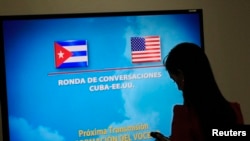The United States and Cuba are holding a second day of talks in Havana aimed at restoring diplomatic relations after more than 50 years.
Both delegations sat opposite one another at separate tables as meetings resumed Thursday morning. Assistant Secretary of State for Western Hemisphere Affairs Roberta Jacobson is leading the U.S. team, and representing Cuba is director of U.S. affairs Josefina Vidal.
No public remarks were made.
The reopening of U.S. and Cuban embassies in the two nation's capitals was expected to be the main focus of the final day of high-level negotiations between the Cold War-era enemies.
Washington planned to call on Cuba to lift restrictions on the number of U.S. diplomats sent to the island, as well as travel restrictions on them during their stays.
While Senior U.S. officials said they hoped Cuba would agree to reopen embassies and appoint ambassadors in each other's capitals in coming months, no timeline had been established.
Immigration discussion
The two sides held a contentious discussion on immigration, including Washington's long-standing policy of allowing Cubans to stay in the United States once they step foot on American soil, on Wednesday.
Havana said the policy entices Cubans to make the dangerous 144-kilometer-long trip across shark-infested waters.
During talks Wednesday, the Americans vowed to continue to grant safe haven to Cubans with special protections denied to other nationalities.
Vidal said the Cuban Adjustment Act, or "wet foot, dry foot," "is a policy that grants exclusive and unique treatment to Cuban citizens, that no other citizens from other nations receive. Therefore, we conclude that this is the fundamental issue that remains as an incentive for illegal immigration."
Jacobson is the highest ranking U.S. official to travel to Cuba in more than three decades.
Cuba's negotiating team is being led by Vidal.
A Cuban diplomat told state news agency Granma that the process of "normalizing" relations between Washington and Havana will take longer than merely reestablishing a diplomatic dialogue.
The unnamed official said, "We must not pretend that everything can be resolved in a single meeting."
Historic talks
The meetings are taking place one month after U.S. President Barack Obama and Cuban President Raul Castro announced the two countries were prepared to re-establish formal diplomatic relations.
Last month's breakthrough occurred after several months of secret negotiations that also involved the Catholic Church.
The talks led to Havana's release of U.S. contractor Alan Gross after five years behind bars. Last week, Cuba released 53 political prisoners, followed by the Obama administration easing some travel and trade restrictions.
Some material for this report came from Reuters and AFP.






